Uncover the centuries-old legacy of Hasami Ware through a guided tour and special lunch experience. Explore the region’s rich ceramic heritage, learning about the meticulous hand-shaping and firing techniques that have endured for generations. Witness how these timeless pottery pieces have seamlessly integrated into modern Japanese daily life, from sleek tea sets to sturdy dinner plates that can withstand the demands of everyday use. Explore the captivating history and contemporary significance of this art form that bridges the gap between tradition and modernity. Prepare to be immersed in the captivating world of Hasami Ware, where the past and present collide in a harmonious display of craftsmanship.
Key Points
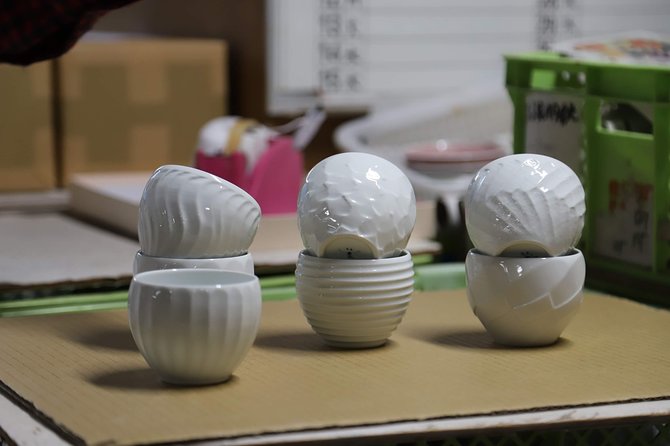
-
Immersive guided tour exploring the 400-year history and evolution of the Hasami Ware pottery tradition in Nagasaki, Japan.
-
Hands-on experience with traditional pottery-making techniques, including the use of a foot-powered pottery wheel.
-
Lunch featuring locally-sourced ingredients, highlighting the integration of Hasami Ware in contemporary Japanese domestic culture.
-
Insights into the meticulous craftsmanship and the commitment to preserving the region’s ceramic heritage.
-
Opportunity to handle and learn about the practical applications of Hasami Ware, from sleek tea sets to sturdy dinner plates.
Overview of Hasami Ware

Hasami ware, a centuries-old Japanese pottery tradition, is renowned for its elegant simplicity and functional design.
Originating in the Nagasaki prefecture, this storied ceramic lineage has endured for over 400 years, adapting to the evolving needs of modern daily life while preserving its distinctive character.
Hasami’s potters are masters of their craft, skillfully shaping clay into a diverse range of utilitarian and decorative pieces that seamlessly blend traditional techniques with contemporary aesthetics.
From teacups and plates to vases and incense burners, Hasami ware’s timeless appeal continues to captivate both local and international audiences, showcasing the enduring allure of Japanese craftsmanship.
Loving the local insights? Here are more guided experiences we recommend in Nagasaki
Historic Significance of Hasami Ware
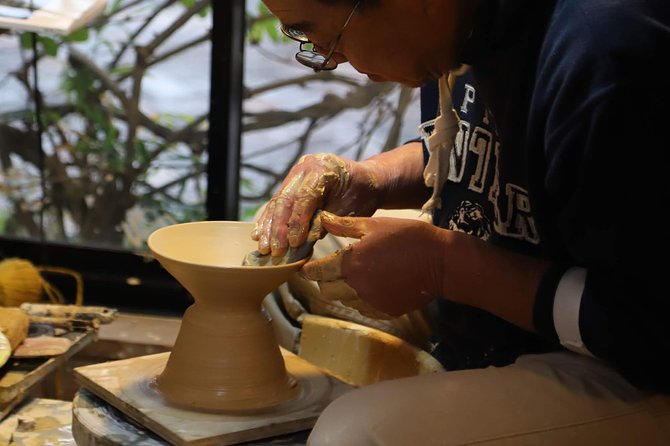
Although Hasami ware’s origins can be traced back over 400 years, its enduring legacy is rooted in the region’s rich ceramic heritage and the adaptability of its artisans to evolving market demands.
Hasami’s potters have continuously refined their techniques, producing a wide range of functional wares that seamlessly blend traditional styles with modern sensibilities.
From delicate teacups to durable bakeware, these versatile ceramics have become an integral part of Japanese daily life, reflecting the region’s commitment to craftsmanship and the timeless appeal of well-designed, high-quality pottery.
As the Hasami Ware Study Tour showcases, this historic art form continues to thrive, meeting the needs of contemporary consumers while preserving the essence of its centuries-old traditions.
Pottery-Making Techniques and Traditions
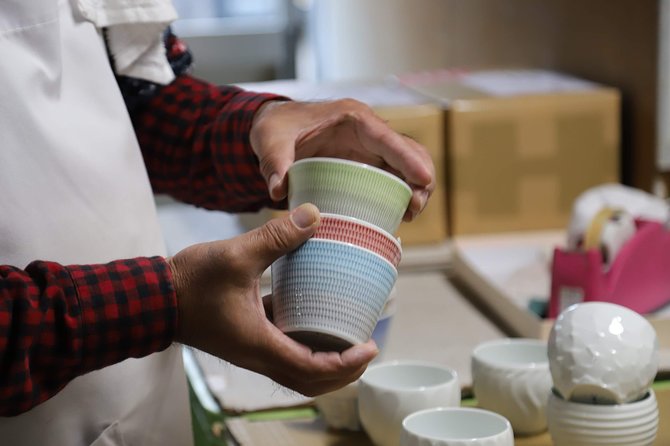
The intricate pottery-making techniques and time-honored traditions of Hasami ware have been honed over generations, enabling its artisans to create a diverse array of functional ceramics that seamlessly blend classic design with modern utility.
From the careful selection of high-quality local clay to the meticulous hand-shaping and firing processes, each step of Hasami’s pottery production is imbued with centuries of refinement.
Skilled potters utilize traditional tools and methods, like the foot-powered pottery wheel, to achieve the distinctive forms and textures that define the region’s iconic stoneware.
This commitment to preserving Hasami’s rich ceramic heritage ensures that these timeless wares continue to grace both historical and contemporary Japanese households alike.
Hasami Ware in Modern Daily Use
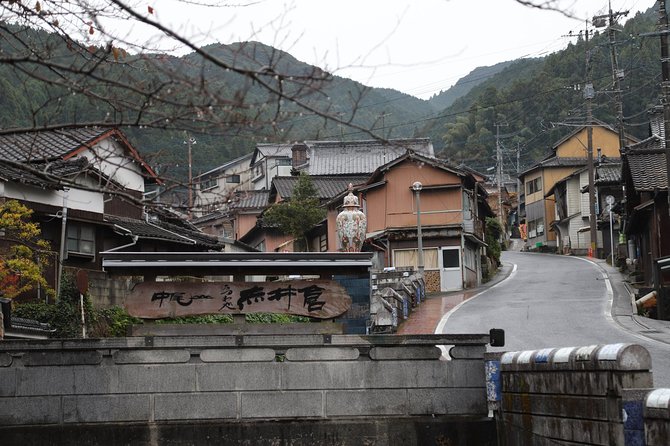
Despite its centuries-old traditions, Hasami ware has seamlessly adapted to the modern-day needs of Japanese households, with its versatile and durable ceramics finding widespread use in daily life.
From sleek tea sets to sturdy dinner plates, Hasami ware’s timeless design and exceptional quality have made it a staple in kitchens and dining rooms across the country.
The pottery’s unique firing process and use of local clay result in pieces that are both beautiful and functional, able to withstand the demands of everyday use.
Whether serving hot meals or displaying artful arrangements, Hasami ware has firmly established itself as an integral part of contemporary Japanese domestic culture, bridging the gap between tradition and modernity.
Lunch and Guided Tour Experience
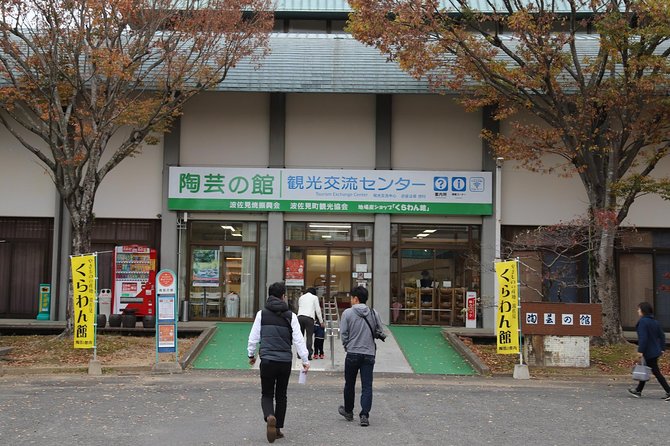
For those joining the Hasami Ware Study Tour, the experience begins with a lunch featuring locally-sourced ingredients, followed by a guided exploration of the pottery’s rich 400-year history and its role in modern Japanese daily life.
The tour guide will lead visitors through the historic production site, sharing insights into the traditional techniques and the evolution of Hasami Ware. Participants will have the chance to handle the pottery, learning about its practical applications in contemporary households.
The tour also includes transportation by taxi, ensuring a seamless and immersive experience. With a maximum of 6 travelers, the Hasami Ware Study Tour offers an intimate and informative look into this enduring Japanese craft.
Fascinated by Nagasaki's past? More historical tours we've covered
- Nagasaki Cultural and WW2 History Tour
- Taste Local Life: Nagasakis Historical Street Walking Tour
- Nagasaki Heritage Trail: Cathedrals, Bridges & Chinatown
- Experience Hasami Ware With Professionals ~ 400 Years History and Modern Daily Use Pottery ~
- Hasami Ware 2-Day Tour With Special Guide ~ 400 Years History and Modern Daily Use Pottery ~
- Romantic Nagasaki: Historical Charms and Seaside Views
Meeting Point and Transportation Options

Participants will meet at Kurawankan (Togei no Yakata), located at 2255-2 Isekigo, Hasami, Higashisonogi District, Nagasaki 859-3711, Japan. This meeting point is conveniently situated just 5 minutes from the Hasami/Arita IC and 15 minutes from the Ureshino IC.
For those traveling by train, the studio is approximately 15 minutes by taxi from JR Arita Station, 15 minutes by Seihi Bus from JR Mikawachi Station, and 40 minutes by Seihi Bus from JR Sasebo Station. Don’t worry about the transportation – the tour includes taxi fees during the excursion.
| Transportation | Time |
|---|---|
| JR Arita Station | 15 mins by taxi |
| JR Mikawachi Station | 15 mins by Seihi Bus |
| JR Sasebo Station | 40 mins by Seihi Bus |
Booking Confirmation and Accessibility
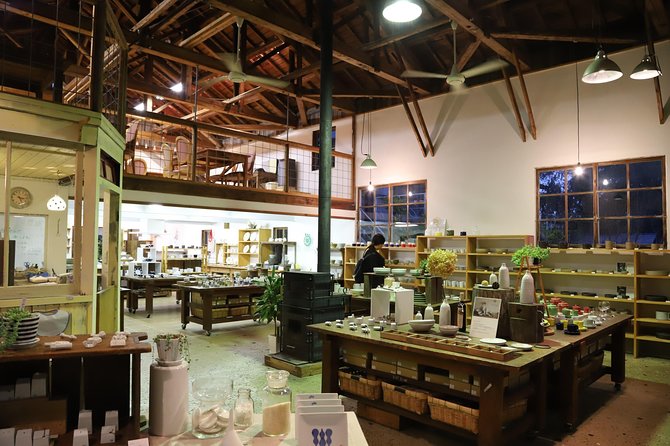
Confirmation of the tour booking is provided within 48 hours, subject to availability.
The experience isn’t wheelchair accessible, though it’s located near public transportation.
The tour group is limited to a maximum of 6 travelers, and it’s operated by 株式会社ヴィジット九州.
Guests should note that the tour is non-refundable. This means that if you need to cancel your booking for any reason, you won’t be able to get your money back.
However, the small group size ensures a more personalized and intimate experience as you explore the rich history and modern applications of Hasami ware pottery. With a knowledgeable guide leading the way, you’re sure to come away with a deep appreciation for this unique Japanese artform.
Tour Operator and Refund Policy
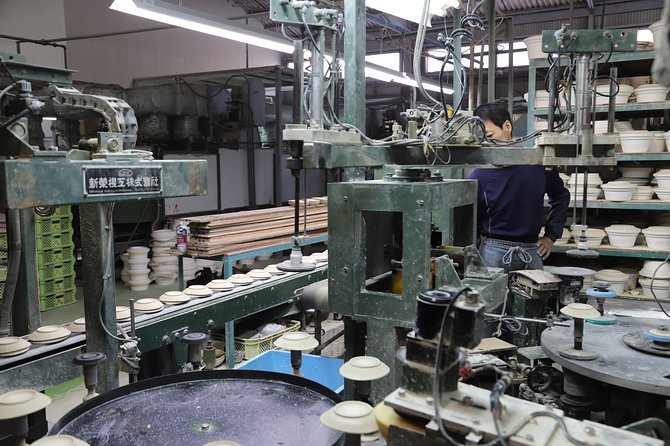
The tour is operated by 株式会社ヴィジット九州, a company that manages the experience. Guests should be aware that the tour is non-refundable, meaning any cancellation will not result in a refund.
| Information | Details |
|---|---|
| Tour Operator | 株式会社ヴィジット九州 |
| Refund Policy | Non-refundable |
| Confirmation | Within 48 hours of booking, subject to availability |
| Accessibility | Not wheelchair accessible |
| Group Size | Maximum of 6 travelers |
The tour’s strict refund policy and limited group size ensure a personalized and exclusive experience for guests exploring the rich history and modern applications of Hasami ware.
Frequently Asked Questions
Is Photography Allowed During the Tour?
Photography is generally allowed during the tour, but visitors should check with the tour guide to confirm any restrictions or guidelines. Some areas may have limits on photography due to preservation concerns or privacy.
Can We Purchase Hasami Ware Products On-Site?
Yes, visitors can purchase Hasami ware products on-site during the tour. The tour includes visits to local pottery workshops and studios where guests can browse and purchase a variety of traditional and modern Hasami ware pieces.
Are There Any Age Restrictions for Participants?
The tour doesn’t have any age restrictions, so participants of all ages can join. Children must be accompanied by an adult. The tour’s activities are suitable for both adults and children to enjoy the Hasami pottery experience.
Can the Tour Be Customized for Our Group’s Needs?
The tour can likely be customized for the group’s needs. Customers should discuss any special requests with the tour operator, as flexibility may be possible within the tour’s operating constraints and availability.
What Should We Bring for the Tour?
For the tour, visitors should bring comfortable walking shoes, a small backpack or bag, and any medication they may need. Plus, it’s recommended to bring a camera to capture the pottery-making process and the scenic tour locations.
Recap
Hasami Ware has seamlessly blended centuries-old tradition with modern functionality.
The guided tour and special lunch experience provide an immersive opportunity to explore this captivating ceramic heritage.
Visitors will explore the meticulous hand-shaping and firing techniques, and witness how these timeless pottery pieces have become an integral part of everyday Japanese life, bridging the gap between the past and the present.
More Guided Tours in Nagasaki
More Tours in Nagasaki
- Full Day Private Shore Tour in Nagasaki From Nagasaki Port
- Nagasaki 6hr Private Tour With Licensed Guide & Bus (Max 15 Pax)
- Semi-Private Guided Tour of Nagasaki (Full Private Min 4 People)
- Nagasaki: Explore Japanese Teas on a Tea Tour
- Fukuoka, Saga, Nagasaki Customizable 1-Day Tour
- Nagasaki Like a Local: Customized Private Tour
More Tour Reviews in Nagasaki
Not for you? Here's more things to do in Nagasaki we have recnetly reviewed
- 9 Best Cruises And Boat Tours In Nagasaki
- 5 Best Full-Day Tours In Nagasaki
- Nagasaki Private Cultural and Historical Tour With Licensed Guide
- Romantic Nagasaki: Historical Charms and Seaside Views
- Cooking With a Local Okaasan at Kominka in Ojika Island Nagasaki
- Mochitsuki Rice Cake Making Experience in Ojika Island
- Letterpress Printing Experience in Ojika Island, Nagasaki
- Fishing for First-Timers in Ojika Island Nagasaki
- Rent a Car and Explore the Island of the Gods, the Iki Island
- Spectacular Terraced Rice Field Walking Experience
- Downtown Walking Tour in Ojika Island Nagasaki
- Sea Kayaking and Beach Clean up in Ojika Island Nagasaki
